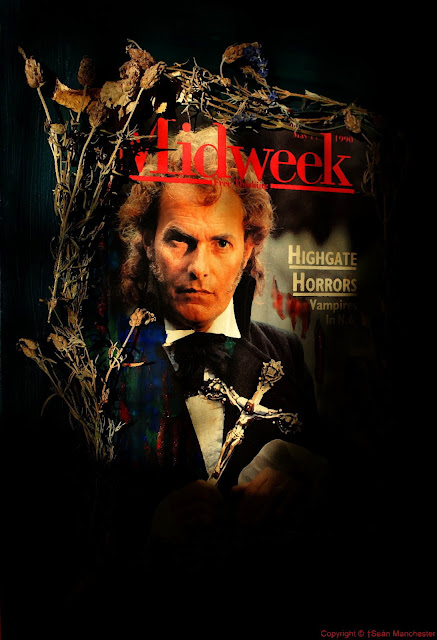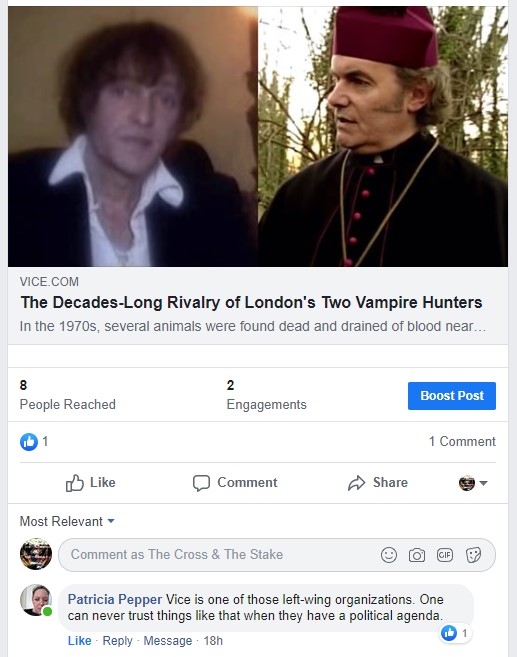To access the answers to Francisco Garcia-Ferrera's four questions click on the images above.
To access Francisco Garcia-Ferrera's article click on the images below.
Francisco Garcia-Ferrera drew himself into the controversy that has existed long before he was born.
Having chosen to publish what amounts to misinformation, falsehood and factual inaccuracy, he now wants to wash his hands of any responsibility for what he has written and published on the internet.
†Seán Manchester's response to Francisco Garcia-Ferrera's less than "rounded" article now follows:
Where do I start?
Francisco Garcia-Ferrera approached me as late 2019 became early 2020. I directed him to a private forum (click on image at the top of the page to access) where I told him I would answer any queries.
I also advised him that much he probably sought to know was already contained in my book The Highgate Vampire. He confirmed that he had not read it.
He asked only four short questions. I offered to address any supplementary or additional queries he might have. There were none.
Consequently, the article he produced is riddled with misleading statements, false claims and error.
Straight away, I am described as "a self-proclaimed exorcist, vampire hunter and bishop of the mysterious 'Old Catholic Church'."
The description "exorcist" is quite obviously an accurate one in view of the fact that I entered the minor order of Exorcistate in early 1973, and had been performing exorcisms bohth before that date and, of course, long after it.
How can the description "vampire hunter" be "self-proclaimed"? This is how I was accurately dubbed by academics, authors, researchers, interviewers and the media generally over the last half a century. I did not "proclaim" myself as such. I had no such need. It was apparent to my readers and most others.
How does he deduce that the Old Catholic Church is "mysterious"? There is nothing mysterious about it. His statement is based on ignorance, ie a lack of ecclesial understanding, information and knowledge. This is probably not the place to elaborate further, but I will gladly do so elsewhere.
Next we are told that "the story officially ended in 1973, when Manchester claimed to have driven a stake through the vampire's heart in the nearby 'House of Dracula' in Crouch End."
The year is incorrect. It was not 1973. The term "House of Dracula" was coined by a local newspaper (the Hornsey Journal). I dubbed it as a house of evil, and "Hell House." The property where the exorcism took place is actually situated on the border of Highgate and Hornsey, not Crouch End. The story did not, of course, end with the 1974 exorcism, as anyone who has read my book will know.
"While Farrant had presided over The British Psychic and Occult Society, Manchester founded the British Occult Society," it is erroneously claimed.
David Farrant's British Psychic and Occult Society was created by him circa 1982-1983. There is no evidence of its existence prior to that date. The British Occult Society was not founded by me. I became its president in June 1967. The British Occult Society was originally formed as an umbrella organisation circa 1860. Much of its activity in the late nineteenth and early twentieth century is shrouded in mystery. The BOS came out of the closet, however, in the mid-twentieth century before finally disappearing in 1988 when it was dissolved under my presidency. During that period I placed emphasis on investigating the claims of the occult and the study and research of paranormal phenomena. Out of this history sprang the Vampire Research Society (formerly a specialist unit within the BOS).
Next we are told: "Both parties heavily advertised a 'magical duel,' which was to take place on Parliament Hill in Hampstead, before cooling down and calling off the clash."
I advertised nothing, and the occasion, which I attended, was not called off. According to the media it was to be a "duel." It was made clear in that from my perspective it would be an attempt to exorcise and heal. David Farrant did not attend for reasons he made known to the local and national press.
"Manchester remains in no mood to relinquish his grip on ownership of the case – it is, after all, almost his entire life's work – while also not exactly forthcoming when it comes to interview requests," Francisco Garcia-Ferrera claims.
The absurdity of the article is summed up in the above sentence. I am approached almost every week, certainly every month, of the year to do a piece to camera, or speak on radio, about this case. Each time I have rejected any attempt to involve me in continuing to publicly fuel more interest in the case, something that was a tiny part of my life's work which is so much more than just one solitary case.
Garcia-Ferrera then says that I "am not exactly forthcoming when it comes to interview requests." That's because I don't give interviews, and haven't done so for many years. But he already knew that.
"I tried to reach Farrant's long-term partner, Della – but she chose not to respond," says Garcia-Ferrera. How do you define "long term"? Della came onto the scene ten years ago, and quickly made a beeline for Farrant. They claimed to be an item from 2013 when on Hallowe'en of that year they had pictures taken at his Muswell Hill Road address. These were allegedly images of a witchcraft "handfasting," even though Farrant had stated back in 1982 that he had outgrown witchcraft. When interviewed by Andrew Gough in December 2009, he said: "I left Wicca in 1982, actually." He self-identified as a Luciferian privately in the 1970s, and publicly in the 1980s, until his death in 2019.
Francisco Garcia-Ferrera ends his piece with this paragraph:
"I'm not really sure what I expected when I asked Sean Manchester for some thoughts on his old rival, but it certainly wasn't a link to a relatively magnanimous self-penned eulogy. Perhaps I should have already realised that, when it comes to the Highgate Vampire, one should leave any reasonable expectations at the door."
A eulogy is a piece of writing that praises someone highly, especially a tribute to someone who has just died. The link I provided, having explained that I would "not pursue this infelicitous matter beyond the veil of death," took the reader to an obituary, not a eulogy. A nuance that is perhaps lost on one who writes for and is published by something called VICE?






























